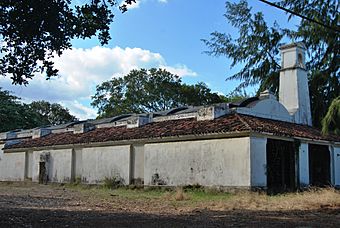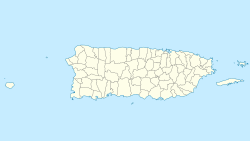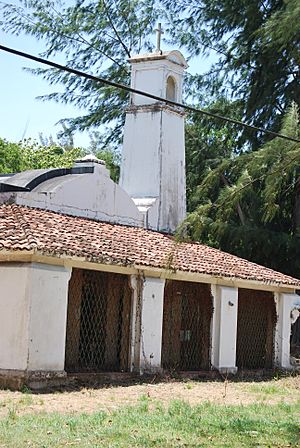Polvorín de Miraflores facts for kids
Quick facts for kids |
|
|
Polvorín de Miraflores
|
|
 |
|
| Location | San Juan, Puerto Rico |
|---|---|
| Built | late 18th Century |
| NRHP reference No. | 84003172 |
| Added to NRHP | March 9, 1984 |
The Polvorín de Miraflores is an old building in San Juan, Puerto Rico. It was built a long time ago, in the 1700s. This special building was used by the Spanish army to store gunpowder and other ammunition. It's located on the island of Miraflores. Because of its important history, the Polvorín de Miraflores was added to the National Register of Historic Places in 1984.
Contents
History of the Polvorín
The Polvorín was built because a military leader named Alejandro O'Reilly ordered it. He visited Puerto Rico in 1765. King Charles III had asked him to check how well the island was protected.
O'Reilly suggested building five special storage places for ammunition. These places, called polvorines, would help protect the island. Some records say the Polvorín de Miraflores was built in 1770, while others say 1776.
From Spanish to American Control
The Spanish–American War ended in 1898. After this war, the United States took control of Puerto Rico. From then until the 1930s, the Polvorín de Miraflores had a new job.
It became a quarantine station. This meant that ship passengers and immigrants arriving in Puerto Rico were checked here. If someone was sick, they would be kept separate from others. This was managed by the United States Public Health Service.
A Chapel and a Cultural Center
In the 1940s, the building changed again. It became a chapel for the Isla Grande Naval Base. It was even renamed Santa Bárbara Chapel. To make it a chapel, some parts of the building were changed. For example, a bell tower was added where a chimney used to be.
The Naval Base closed in 1971. The building was then given to the Institute of Puerto Rican Culture. During this time, it was used for cultural events. The San Juan Ballets and the San Juan Choir used the building for their performances. In 1984, it officially became part of the National Register of Historic Places.
Recent Years and Future
Later, the building was taken over by the Puerto Rico Department of Transportation and Public Works. They used the property to store vehicles. Over time, the building was left empty and started to fall apart.
Recently, the structure was given to the Convention Center District. This led to the removal of the old vehicles from the property. This historic building is now ready for its next chapter.
 | Stephanie Wilson |
 | Charles Bolden |
 | Ronald McNair |
 | Frederick D. Gregory |



